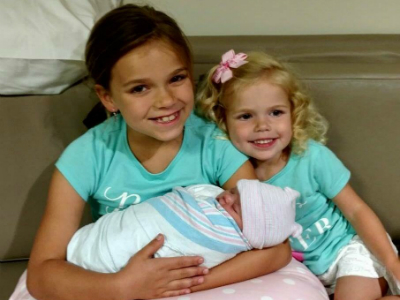
Penelope's Story

9-year-old Hannah and 4-year-old Caroline share a special bond with the newest addition to their family – their 8-month-old sister, Penelope.
“Hannah won’t let anyone else take her out of her car seat when we arrive home from school,” says Allison Seabolt, the girls’ mom. “She always wants to rock Penelope and sing to her. She’s very mothering. Caroline also joins in the fun singing and dancing and laughing.”
Before Penelope was born, the family wasn’t sure that making any of these memories would be possible.
During Allison’s 20-week ultrasound, her obstetrician in Fredericksburg said something didn’t seem quite right to her and sent the family to a local maternal-prenatal medicine specialist for a closer look. The specialist saw some other warning signs too, and recommended that the family seek care at Children’s National Hospital in Washington, D.C. Just two weeks later, Penelope was diagnosed with Down syndrome and complete atrioventricular canal defect.
Allison recalls the moment when David Schidlow, M.D., M.Mus., a prenatal cardiologist at Children’s, confirmed the diagnosis, saying, “That’s when it hit us. After Dr. Schidlow did a fetal echocardiogram, we walked into a room full of doctors, nurses and social workers. He explained the test results and informed us that Penelope would need open heart surgery soon after she was born. While it was all overwhelming, it also was so comforting to know that my unborn baby already had a team.”
Complete atrioventricular canal defect is characterized by a large hole in the heart and an abnormality of the inflow valves, all caused by abnormal development of the central portion of the heart. The condition doesn’t allow blood to flow properly through the heart and out to the body. Instead, too much blood flows into a baby’s lungs, causing congestion, difficulty breathing and ultimately stunting growth. This condition is rare – occurring in approximately one out of 5,000 newborns globally each year – but it disproportionally affects children with Down syndrome, about 40% of whom have this defect.
The good news, says Dr. Schidlow, is that the care team is able to identify the condition and create a treatment plan even before the baby is born.
“One of our most important goals as prenatal cardiologists is to help families prepare to care for a child with a congenital heart defect. We want families to understand the diagnosis and the treatment plan, and we want to answer as many questions as possible before the baby is born,” says Dr. Schidlow. “It brings a lot of comfort when families know what to expect.”
When Penelope arrived about 20 weeks later in June 2016, everyone was ready. Dr. Schidlow used telehealth to consult with physicians in Fredericksburg where Penelope was born to re-confirm the diagnosis and begin care.
At about 2 months old, Penelope began struggling to eat and her growth slowed. She also needed medication to help alleviate the extra fluid on her lungs. It was just as Dr. Schidlow predicted, Allison recalls. It was time for Penelope’s heart surgery.
“It was scary and overwhelming, but I am so grateful for everything that the team at Children’s did for us,” said Allison. “Our social worker even made sure that when we arrived in D.C., our room at the nearby Ronald McDonald House was all setup. All we had to do was show up for the surgery.”
On October 11, 2016, Pranava Sinha, M.D., a cardiac surgeon at Children’s National, performed the seven hour surgery to repair Penelope’s heart. Children with this heart defect who develop early severe heart failure and need early surgery tend to have a prolonged recovery. Penelope, however, had a beautiful recovery course and was discharged to go home in six days.
“Penelope has a beautiful surgical result. The holes in her heart are completely closed and her inflow valves are working perfectly,” says Dr. Schidlow. “She recovered quickly from her surgery and is growing, thriving and happy. It is truly wonderful to see. ”
Today, Penelope is enjoying life at home with her two big sisters, and Allison is thankful for the care she received at Children’s.
“The doctors and nurses blew us away – they are amazing,” she says. “When they predict something about your child, they know exactly what they are talking about. They can tell you the good, the bad and the ugly. They tell you what to expect, and they are right. You can have confidence and trust in them.”


